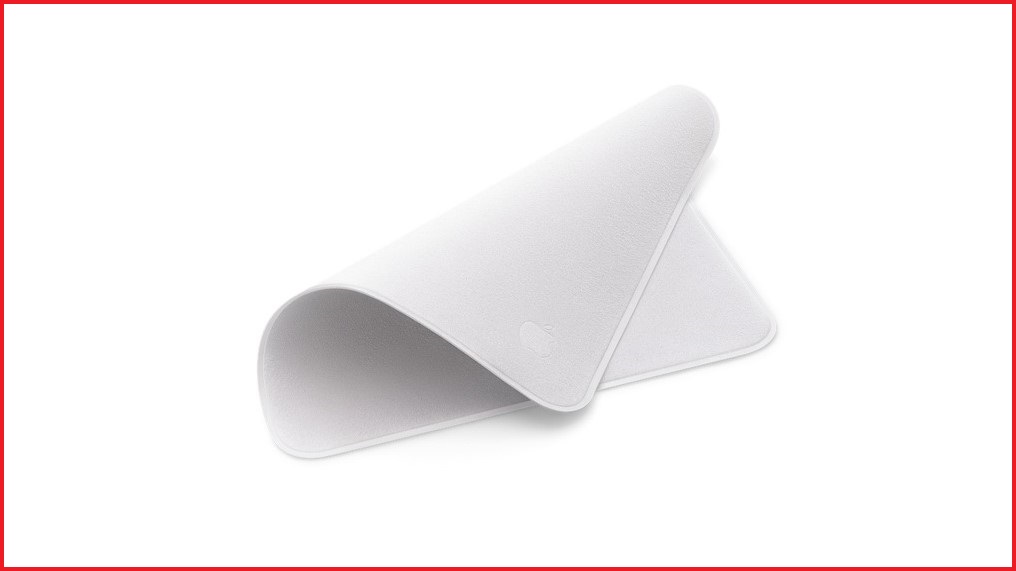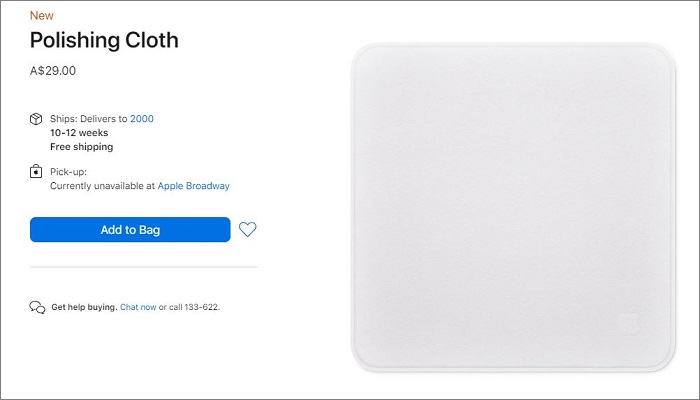Apple is experiencing extraordinary demand for one of its products – and no, it isn’t the latest MacBook or Apple Watch. It doesn’t even have WiFi.
The internet gave Apple’s $29 (US$19) Polishing Cloth the full meme treatment over the past two weeks causing the micro-fibre cloth to fly off the shelves.
It’s now on back order until January 2022.
What exactly is so special about the Polishing Cloth?
Based on the product overview, not much.
According to Apple, it’s “made with soft, non-abrasive material, the Polishing Cloth cleans any Apple display, including nano-texture glass, safely and effectively.”
You’d be right in thinking that description matches basically any of microfibre cloths that come free with prescription glasses.
Upgrading from the Polishing Cloth (1st Generation) to the Polishing Cloth (2nd Generation), it’s a huge leap! ✨ pic.twitter.com/r1aRZd054f
— Gui Schmitt (@guischmitt) October 26, 2021
And if you go to the website of a certain online retail behemoth, you can buy a dozen microfibre cloths for less than $10 – and you won’t have to wait three months for delivery.
Which is precisely why the Polishing Cloth has been turned into a meme: it’s a product of unnecessary opulence.
How do you feel about waiting 10-12 weeks for a cloth delivery? Image: Apple
For $29 what you get (when it eventually comes back in stock) is a thick, light-grey cloth embossed with the Apple logo. Just one.
It even comes packaged in a small rectangular box – talk about premium!
$AAPL is up today. You’re welcome. #applecloth pic.twitter.com/WEUZ4Hp0AC
— Albert C. Lee (@albertclee) October 26, 2021
The New York Times, in its coverage of the Polishing Cloth (yes, it’s gotten a bit out of hand) spoke with the Albert Lee, director of a New York consulting firm, about his purchase of four Polishing Cloths.
“It’s just a point of sheer excess,” he said. “I just spent $4,000 on a laptop. What’s another $19?”
Indeed, when you’re spending that much on a new MacBook, the extra cost of an expensive cloth to clean it with is hardly anything to balk at.
New from Apple
Beyond “sheer excess,” the Polishing Cloth phenomenon is also illustrative of other cultural moments.
Apple is arguably benefitting from the same fear of missing out (FOMO) and wanting to be in on the joke that helped fuel the rise of NFTs and meme cryptocurrencies like Shiba Inu, perhaps pointing once again to the power social media has to move money.
Because of its sudden popularity, there is an active secondary Polishing Cloth market on sites like eBay where people have remarkably sold the cloth for more than double their retail value.
Someone has sold 16 of these on eBay?! Image: eBay
The Polishing Cloth also provides a couple of insights into how deeply Apple’s products are embedded into the zeitgeist.
For one, the media uptake – including this story – shows how relatively easy it is for Apple to drive online conversation with a small, relatively innocuous product that, crucially, isn’t affected by the chip shortage that contributed to Apple missing its quarterly earnings targets last week.
Likewise the cloth phenomenon hints at a deep hunger, among the media and Apple fans alike, for something new from a company that has been otherwise content with gradually iterating the same series of products for years now.
As the Sydney Morning Herald’s Alice Clarke noted when reviewing the latest Apple Watch last month, “the problem is that once a device has been the best for so long, it’s difficult to offer much new”.
Rumours of an Apple car have been swirling for years but the tight-lipped company has yet to make any public announcements.
Similarly, Apple is understood to be quietly working on augmented and virtual reality devices that would help it compete with Meta (formerly Facebook) in building ‘the metaverse’.
But until these projects become a reality, Apple fans will be left polishing their existing products with a $29 cloth.












